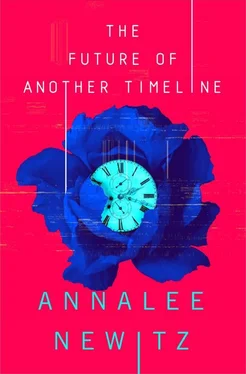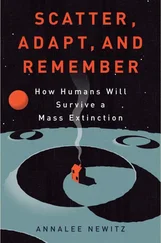A bell tinkled as I opened a wooden door set into the cave entrance, as if this were a dry goods store. Beyond an unoccupied reception desk was the library, whose battered chairs and tables looked pretty much the same as they did in 2022—though they lacked a fleet of computer terminals. I was about to take some creaky stairs up to the council offices when somebody shouted my name.
It sounded like Anita, but that couldn’t be right.
“Tess! You’re here!” Definitely Anita. What the hell? Had something gone horribly wrong? I walked into the library, and found her sitting with C.L. and a few students, surrounded by piles of books. Despite the weirdness of seeing both her and C.L. in the wrong time, I suddenly felt like everything would be all right. My best friend was here. I practically knocked over the table next to her in the midst of our enthusiastic hug.
“Why are you both in 1893?”
C.L. cleared their throat. “We’re… uh… researching… things?”
I was nonplussed. “What’s going on? Has something happened with the Applied Cultural Geology Working Group?”
Anita and C.L. looked furtively at each other. “We need to talk to you about something.”
“Tell me.”
“It’s… private.”
The students made a big show of leafing through their books and tried to act like they weren’t listening. Anita glared at them until they suddenly decided it was time to go out for brunch in Englishtown.
When the door slammed in a cacophony of bell noises, C.L. jumped up and started pacing. I noticed they had a new ocular implant, forming a faint crescent-shaped bulge over their right eye. “I’ve completed my field season, and anomalies are increasing at the Machines. A few more people came back covered in extinct single-celled organisms from the Ordovician. One told me off the record that he’d seen a glimpse of an archive cave, like you did. So I’ve been systematically going back to different periods in the Raqmu Machine, trying to figure out if something in the mechanism has changed. I kept wondering whether the wormhole might be dipping into the past before linking to the correct time. It’s kind of what you’d expect if the interface were… buggy, I guess.”
“The Comstockers?” I felt cold.
“Well, it might be wear and tear. More people than ever are using the Machines, and we’re using them in new ways. Morehshin showed us that there are parts of the interface that we didn’t know existed, and we have to assume people are using those in the future all the time. But…” They looked uncertainly at Anita.
“But what?”
“The Comstockers may be getting somewhere. My guess is that they’re destabilizing the wormholes. I went back to the Ordovician from here and found these cuts in the rock, with traces of metal alloy in them that could only come from humans…”
“Why would sabotage on the Raqmu Machine affect Flin Flon, though?”
“You know the hypothesis that the Raqmu Machine controls the others? If that turns out to be true, then all they have to do is destroy this one.”
“And then we’re completely fucked.” Anita was grim. “We’ve got to stop these shitlords before that happens.”
“I don’t get why they would do this. If they lock the timeline, they can’t make edits either. They might get stuck in a timeline where… I dunno, things are pretty much like this one. Universal suffrage.”
Anita looked at me like I had eaten a library book.
“Don’t you think it would be bad enough if we were fixed here in this timeline, where women can’t get abortions and black kids are being murdered by cops? They don’t need to take away our right to vote to make our lives hell.”
She was right, as usual. “So… why did you come to find me?”
“We need Morehshin to take all of us back to 13 B.C.E. There’s someone there I need to see.”
“That’s where we were headed anyway.”
Anita nodded curtly. “Excellent. I’ve already booked us on the Machine.”
“Okay, but I am still confused. How did you know that we would be here?”
Anita’s expression was unreadable. “Ah. You don’t know yet.”
I blinked. “What do you remember?”
“A Spiritualist named Sophronia Collins committed suicide under very mysterious circumstances, after Anthony Comstock got her convicted for obscenity during the World’s Fair. I wasn’t sure, but I guessed that was your handiwork. Especially because you wrote that paper about secret travelers using suicide as a cover to escape their present. I figured you’d hidden her in the past, and that meant you’d come through here. I’ve been waiting for a couple of weeks.”
“I came down a couple of days ago,” C.L. added. “Anita said you’d be here.”
“What about… is anything else different? The Comstock Laws?”
Anita shook her head. “Abortion is illegal.”
The edit war was far from over, but I was intoxicated by the news that at least part of my edit had taken. I couldn’t quite believe it. When I’d studied this period, there was no record of a person named Sophronia Collins fighting Comstock. I’d met her by chance at the Algerian Village. I allowed myself a moment of satisfaction. It was the first time I’d made an edit of any significance, and that meant I might be on the right track.
* * *
Early the next morning, Anita knocked on the door of our room at the inn. “We’ve got a slot at 9:30 A.M. Let’s go.”
Morehshin would be doing another demo of her collective travel technique for a small but admiring audience of scholars and techs. The Machine room at al-Khaznah was already full when we arrived, its sandstone walls carved with abstract designs and inscriptions in pre-Nabataean. Some of these explained the rudiments of the interface, which the ancients treated like rule-based magic. Now, there were two steam-driven tappers in place to pound out the pattern that would open a passage to our destination. We stood at the center of a shallow bowl worn into the smooth rock by thousands of travelers over thousands of years.
“You must all be touching me when we do this.” Morehshin waved us in close. I wrapped my arm around Morehshin’s waist, then positioned Soph’s back against my chest, her arm curved around Anita. Anita tucked C.L. between the two of us. At last, we were all spooning each other and hugging Morehshin as tightly as we could. From above, we must have looked like we were doing a Busby Berkeley dance. But from eye level, we were merely a group of travelers, slightly sweaty and desperate. Morehshin reached out and clawed the air open overhead, revealing that square black interface controller I’d seen for the first time at Flin Flon. Inside it, attenuated light wavered like it was traveling through fluid. Then Morehshin drew a zigzag shape in the air, while palming the multi-tool. It strobed pink.
“Hold on!”
I had never gripped my sisters harder than I did in that moment. Fluid sloshed up from the floor, filling my nose and mouth with a swampy froth, and then we were in wormhole free fall until we landed hard in the middle of nowhere. There were no bureaucrats or techs. We stood on a bright, sandy cliff, sterile except for a few patches of lichen that looked like black stains. A shallow emerald ocean stretched below, thick with vegetation that broke the surface. The air smelled intensely of salt. And then, with a shock, I noticed the rock ring, its rough red surface encircling us. Overhead, the canopy looked like a parasol made of fluid, filtering the light through rippling waves.
A peculiar silence hung over everything, and I realized there were no birds calling to each other over the swells. I could hear only faint waves and wind scouring the seemingly infinite volume of empty yellow rock behind us.
Читать дальше








![Аннали Ньюиц - Автономность [litres]](/books/424681/annali-nyuic-avtonomnost-litres-thumb.webp)



